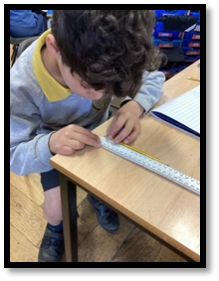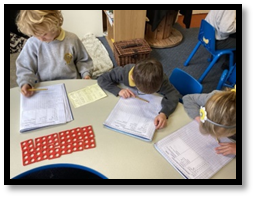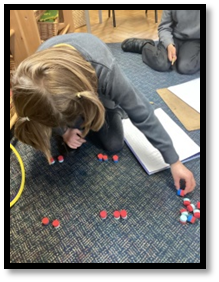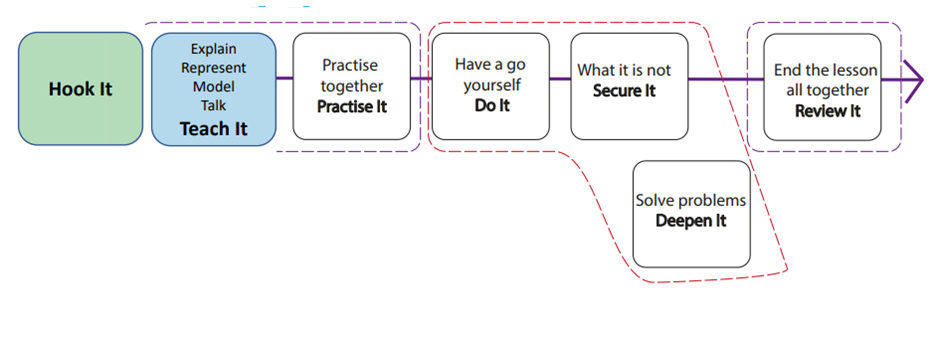Mathematics at CKIS
Our vision for Mathematics at CKIS



We believe that all pupils at CKIS will experience the beauty, power and enjoyment of mathematics and develop a sense of curiosity about the subject. We aim to raise the profile of mathematics by demonstrating to children how useful and powerful mathematics is as a means of communication and as a tool to solve every day problems. We aim to promote an interest in the subject and to develop understanding of it, as a tool to make sense of the world. At CKIS, we foster positive ‘can do’ attitudes, believe all children can achieve in mathematics, and teach for secure and deep understanding of mathematical concepts. We use mistakes and misconceptions as an essential part of learning and provide challenge through rich and sophisticated problems.Purpose and aims of Mathematics (Intent statement)
Our curriculum has been developed over time through:
• Initial participation in a Teacher Research Group introducing the mastery curriculum.
• Continued involvement in the local GLOW Maths Hub
• Being active participants in the Sustaining Mastery Group.
• Being part of research led training, development and support
• Networking with other schools and settingsOur curriculum provides a broad range of experiences for our pupils: Our pupils’ backgrounds, our culture and our climate for learning provide the following drivers that underpin ALL areas of our Mathematics curriculum:
Learning to learn - which helps pupils to concentrate and focus and build resilience as learners.
• We foster a ‘can do’ attitude which encourages children to be resilient and to keep trying.
• Children are not grouped by ability which means everyone learns together and strives to achieve.
• Our lesson structure and learning environment supports children to challenge themselves.
Culture and Diversity - which helps pupils to develop enquiring minds about the wider world.
• We teach children that mathematics is a universal language and that it is used across the world.
• We use STEM activities and educational visits to develop enquiring minds about the wider world.
• We use mathematics in other everyday activities e.g. money, weighing, capacity etc.
• We demonstrate and model why mathematics is useful in wider life and the wider world.
• We explore how people from different genders, cultures and periods use mathematics in their lives.
Environment and Community - which helps to instil in our pupils a respect for our environment and for our local and wider communities.
• Children develop map reading skills and use scales to measure distance when learning about their community and the wider world.
Creative arts and physical development - which helps our pupils to express themselves and excel as holistic learners
• We celebrate patterns in nature and in our environment (reflection, tessellating, repeating patterns etc).
• We use mathematics to measure physical fitness during PE lessons, play times and challenge time.
We aim for all pupils to:
• become fluent in the fundamentals of mathematics (see year by year Curriculum Maps) so that they develop conceptual understanding and the ability to recall and apply knowledge rapidly and accurately.
• solve problems by applying their mathematics to a variety of problems with increasing sophistication, including in unfamiliar contexts and to model real-life scenarios.
• reason mathematically by following a line of enquiry and develop and present a justification, argument or proof using mathematical language.
• have an appreciation of number and number operations, which enables mental calculations and written procedures to be performed efficiently, fluently and accurately.
The teaching of mathematics at CKIS (Implementation)Planning in the EYFS follows the Early Years Foundation Stage Statutory Framework and is supported by the DfE’s ‘Development Matters’ document. Children in Reception are taught mathematics in a systematic way using ‘The National Centre for Excellence in the Teaching Mathematics’ (NCETM) Mastering Number Program and resources. There is a significant emphasis on concrete and pictorial representations used to develop an understanding of mathematics. Children are encouraged to use, enjoy, explore, practise and talk confidently about mathematics using reasoning both in daily maths lessons and in their continuous provision (Challenge Time). The children are exposed to practical resources like Numicon, ten frames and other concrete materials to master key concepts. ‘Can Do’ maths resources are used to supplement the teaching and learning of mathematics.
In KS1 we use the ‘Can Do’ approach which is based on the National Curriculum Mathematics Programmes of Study and provides a progressive mastery curriculum. Mathematics is taught to children through carefully planned whole-class lessons that aim to develop their mathematical understanding. To ensure that every child can access the learning, key concepts are broken down into smaller steps. Some children may require additional resources, support, and scaffolding to grasp new concepts. The development of conceptual understanding is facilitated through the use of concrete resources and visual representations, and children are encouraged to explain their reasoning during daily maths lessons. This approach helps children to achieve a deep understanding of mathematical concepts that can be sustained over time. As children build on prior knowledge, they consolidate key skills they have already learned. Effective questioning assesses conceptual and procedural knowledge, draws out children’s reasoning and addresses possible misconceptions. Sentence stems provided by teachers scaffold children’s articulation of mathematical reasoning and precise use of vocabulary. Key facts such as multiplication tables and addition facts within 10 are learnt to automaticity to avoid cognitive overload in the working memory, enabling pupils to focus on new concepts. A variety of additional mathematical opportunities are also available within our continuous provision, enabling children to make the connections needed to enjoy greater depth in learning. If a pupil fails to grasp a concept or procedure, this is identified quickly, and early intervention ensures the pupil is ready to move forward with the whole class in the next lesson.
In addition to daily mathematics lessons, students also engage in daily ’Magic Maths’ lessons. During these lesson children have opportunity to revisit previously taught learned knowledge, concepts and procedures to ensure that once learned, mathematical knowledge becomes deeply embedded in pupils’ memories. In KS1 these sessions are supported by the NCETM Mastering Number Program and focus on practising key number and arithmetic skills. These sessions are designed to develop solid number sense, including fluency and flexibility with number facts.
Mastery Mathematics Lessons in KS1 – approx. 40 mins
In KS1, each lesson focusses on a manageable step of new learning based on the National Curriculum statements.
Typical Lesson design:
1 - Revisit: a quick recap of the last lesson
2 - Hook It: Introduction and time to engage the interest of all children
3 - Teach It: Live modelling of the new learning with explicit use of potential misunderstandings
4 - Practise It: All children practise together using concrete resources where appropriate - Support & Challenge
5 - Do It: Up to 5 examples – 5 ‘What it is’ or ‘3+2 ‘What it is/What it’s also’
Challenge 1: Procedural Fluency
6 - Secure It: 1 or 2 Misunderstandings (True/false, Spot the mistake)
Challenge 2: Conceptual Understanding
7 - Deepen It: Apply understanding to solve new problems
Challenge 3: Mathematical Thinking
8 - Review It: Lesson Recap: Key Concept Statement and Key Vocabulary
Mathematics outside the classroom
All children have individual access to NUMBOTS (an online learning platform) and are encouraged to practice for 5-10 mins a day to work on recalling basic number facts and fluency. Children are also directed to the ‘White Rose 1 Minute Maths’ app to practise the recall of basic number facts and operations.We ensure the children are ready for the KS2 curriculum by carrying out detailed handover meetings with the Year 3 (Y3) team at Charlton Kings Junior School (CKJS). CKJS also use a mastery approach therefore the children are well equipped to access the mathematics lessons. We share assessment data with CKJS teachers to show individual strengths and areas for development. The Y3 teachers visit the Y2 classes in the summer term to see the children during a typical mathematics lesson and have discussions with the Y2 staff. In the autumn term Y2 staff visit the Y3 classes to answer any questions and check the children are on track with their learning.
Oracy plays a key part in our mathematics learning across the school. Children are taught subject specific vocabulary, which is modelled and reinforced by adults in the classrooms as well as being displayed. Stem sentences support children and enable them to use mathematical language accurately to explain their ideas. From Kindergarten to Y2 we use a range of literature, rhymes and songs to help engage our children and embed their learning. In KS1 discussion plays a key part in our ‘Hook it’ part of the lesson when all children are encouraged to share what they notice. Children apply class discussion guidelines during these times. We also actively encourage discussion when working on the 'Secure it' part of the lesson when children need to reason and explain using the key vocabulary and stem sentences.
Demonstrating learningIn the EYFS children demonstrate their understanding through their responses in lesson time, when completing challenges in the continuous provision and during day to day classroom life. Teachers may choose to record samples of the children’s learning by placing an observation on See-Saw or by storing written evidence in their folders.
In KS1 pupils demonstrate their learning in their mastery maths books and through enrichment tasks in the continuous provision. These are observed and could be recorded using Seesaw.
Meeting the needs of all pupils (inclusion)Our school supports the principle that young children learn through play, and through well planned structured opportunities that are relevant, engaging and promote deep level thinking and learning. The whole mastery approach to mathematics ensures that all children achieve through breaking the key concepts into small manageable steps with each child being given additional resources, support, and scaffolding where needed.
Children also have access to a rich continuous provision in mathematics, paired work, small group and whole class learning opportunities skilfully builds upon the experiences of the child and promotes their next steps as a learner.
Teachers and Teaching Partners competently provide a balance of structured cross curricula learning activities and child-initiated opportunities through high quality indoor and outdoor learning environments. In this way we aim to ensure that children are actively involved in their learning and deepen their knowledge, skills and understanding becoming masters of their learning as:• Problem solvers
• Resilient learners
• Collaborative thinkers
• Inspired questionersAll pupils are entitled to a broad and balanced curriculum that meets their needs.
Mathematics is taught in class groups, and accessible in our provision with all pupils included. All our teachers know the pupils in their class and their differing needs well. They plan and adapt lessons to help all pupils know and remember more so they make very good progress.Some pupils, including those with special educational needs or disabilities, or those with English an as additional language, may need extra support to access, understand and remember key concepts.
For these pupils, teachers use a range of effective strategies, whilst promoting independent learning as far as possible. These may include:
● adapting and scaffolding pupil activities and resources
● focussed additional support from an adult in class
● extra pre learning or overlearning of key knowledge before or after the lessonSome pupils very quickly grasp the main concepts being taught and are able to think more deeply to extend their learning. To ensure they reach their full potential, teachers may:
● set more complex activities that require thinking at greater depth
● ask pupils to apply their knowledge to a different situation
● go further by asking them to explain their thinking to others or present their findings to a group
Assessment (Impact)At CKIS children access mathematics at a level that is appropriate for their individual needs, resulting in a classroom of enthusiastic, confident and engaged learners. Children speak passionately about mathematics, they strive to use correct vocabulary and apply mathematics independently to solve everyday problems.
At CKIS, a mathematical concept or skill is considered mastered when a child can demonstrate it in multiple ways, using mathematical language to explain their ideas. Children have quick recall of facts and procedures and have the ability to move fluidly between different contexts and representations of mathematics while making connections. Children at CKIS demonstrate confidence in their ability to achieve and take pride in presenting and understanding their work.
At CKIS children make good progress and this is monitored in accordance with the school assessment policy.
Formative Assessment
At CKIS teachers constantly assess how far their pupils understand key concepts throughout lessons, through questioning, observation and feedback. Teaching is adapted immediately for those children who need extra support. This is done through teacher-led "scoop groups". Quizzes and other games are regularly used to assess how far pupils have remembered learning from the lessons before. Teachers then adapt their planning and/or teaching to ensure misconceptions or gaps in knowledge are addressed. In addition, they may need to introduce opportunities for more challenge or deeper thinking.
End of unit Assessment
In EYFS and KS1 assessments of children's learning are made and assessed through observations and classwork and shared as evidence on SeeSaw. These assessments contribute to a summative judgement at the end of each term against our school progression documents.
In KS1 end of unit ‘Remember It’ quizzes from Can Do are also used to assess children’s learning. The data is then used to plan interventions to address any gaps in learning for individual and/or groups.
Teachers and subject leads monitor children’s progress and attainment in mathematics throughout the year to inform ongoing teaching and learning.
Reporting to families and statutory assessmentAT CKIS we report to parents twice a year at parents’ evenings and then in our end of year school reports. Throughout the year we keep families up to date with their children’s learning through photos and videos on seesaw.
Summative data is submitted for Year 2 as required nationally using the ‘Exemplification of Standards in Mathematics’ to inform our judgements.
Assessment should seek to raise standards in mathematics by informing interventions and ensuring that provision remains well-informed to enable optimum progress and achievement.Monitoring and Evaluation
The subject leaders for mathematics monitor the quality of education regularly in accordance with the school’s monitoring timetable. They provide professional leadership and management for mathematics and will ensure that it meets the aims and objectives of the school through:
• Raising the profile of the subject and modelling best practice, as appropriate to new staff, ECTs and peers to support continued professional development.
• Monitoring progression and continuity throughout the school through team teaching, learning walks and regular monitoring of children’s learning (books, Seesaw and pupil voice). These are usually with a member of the senior leadership team, and sometimes with a governor.
• Monitoring children’s progress through analysis of whole school data and using this data to inform the subject action plan
• Organising and auditing subject resources
• Participating in the Sustaining Mastery Program (Keeping up-to-date with current developments in mathematics and disseminating information to colleagues as well as accessing workshops, Subject Knowledge/Curriculum Planning sessions and GLOW live maths lessons)Subject leaders have regular support from the senior leadership team where aspects of the subject policy and action plan are monitored and discussed. Action plans are reviewed and shared with the staff three times a year to ensure all staff are aware of key actions. Resulting actions may emerge with additional leadership support, resources or policy changes implemented. Subject leaders routinely have a teacher appraisal objective linked to an aspect of their subject leadership. Following all these activities, strengths and areas for development are reported and discussed with staff. Resulting actions are recorded on the subject action plan and reported to governors.
At the end of each year the action plan for mathematics is fully evaluated. In addition, the subject leader evaluates how far mathematics is meeting our curriculum intent statement. This evaluation feeds into the action plan for the following year. Evaluated action plans and evaluations are reported to the senior leadership team and governors.The role of the governors
Every subject has a specific governor allocated to it. The governor for Mathematics is Dafna Ashworth.
This governor evaluates the activities within this aspect and the impact on the quality of education and pupil outcomes. They meet with subject leaders and review aspects of the subject, including seeing lessons in practice and talking to children. Their findings are reported to the Governing Board. In this way, leaders are held accountable for the aspects they are responsible for, and subject leaders are able to access the appropriate support and resources to achieve their aims.


